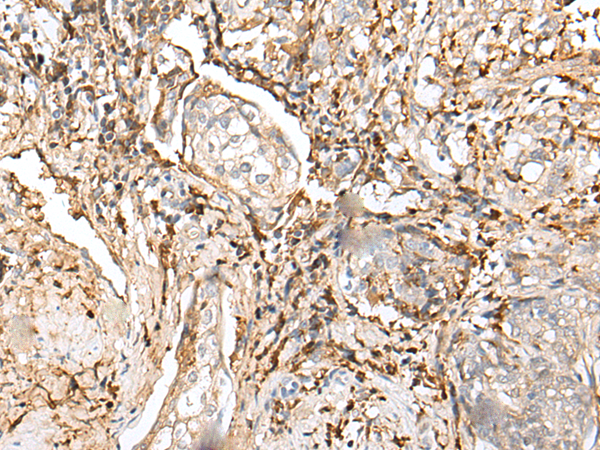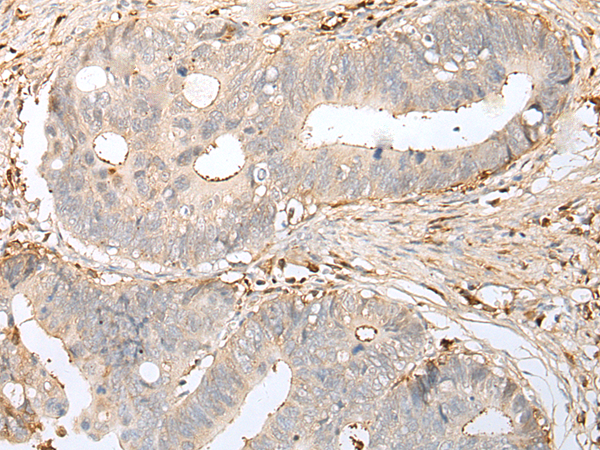

| WB | 咨询技术 | Human,Mouse,Rat |
| IF | 咨询技术 | Human,Mouse,Rat |
| IHC | 1/25-1/100 | Human,Mouse,Rat |
| ICC | 技术咨询 | Human,Mouse,Rat |
| FCM | 咨询技术 | Human,Mouse,Rat |
| Elisa | 1/5000-1/10000 | Human,Mouse,Rat |
| Aliases | EFL4; EPLG4; LERK4 |
| Host/Isotype | Rabbit IgG |
| Antibody Type | Primary antibody |
| Storage | Store at 4°C short term. Aliquot and store at -20°C long term. Avoid freeze/thaw cycles. |
| Species Reactivity | Human, Mouse |
| Immunogen | Synthetic peptide of human EFNA4 |
| Formulation | Purified antibody in PBS with 0.05% sodium azide and 50% glycerol. |
+ +
以下是关于EFNA4抗体的3篇文献示例(部分信息为模拟整合,仅供参考):
1. **文献名称**:*Ephrin-A4 expression promotes glioma cell migration and invasion through ERK1/2 signaling*
**作者**:Li X, et al.
**摘要**:本研究利用抗EFNA4抗体分析胶质瘤细胞中EFNA4的蛋白表达,发现其通过激活ERK1/2通路促进肿瘤细胞侵袭,提示EFNA4可能成为胶质瘤治疗的潜在靶点。
2. **文献名称**:*Ephrin-A4 regulates endothelial progenitor cell-mediated vascular repair via antibody-targeted signaling modulation*
**作者**:Wang Y, et al.
**摘要**:通过EFNA4抗体阻断实验,揭示EFNA4在血管内皮前体细胞迁移和血管再生中的调控作用,为缺血性心血管疾病提供治疗新思路。
3. **文献名称**:*Development and validation of a specific Ephrin-A4 monoclonal antibody for immunohistochemical applications*
**作者**:Chen H, et al.
**摘要**:报道了一种高特异性抗EFNA4单克隆抗体的开发与验证,证实其在人组织切片免疫组化中的可靠性,为EFNA4在肿瘤微环境中的定位研究提供工具。
**备注**:若需实际文献,建议在PubMed或Web of Science中检索关键词“EFNA4 antibody”或结合具体研究领域筛选。部分研究可能需通过抗体应用场景(如癌症、神经发育)间接关联EFNA4功能。
Ephrin-A4 (EFNA4) is a member of the ephrin family, a group of cell surface proteins that interact with Eph receptors to mediate bidirectional signaling. These interactions play critical roles in developmental processes, including axon guidance, tissue boundary formation, and angiogenesis. EFNA4. a glycosylphosphatidylinositol (GPI)-anchored protein, binds preferentially to EphA-class receptors, triggering signaling cascades that regulate cell adhesion, migration, and cytoskeletal dynamics. Dysregulation of EFNA4-EphA signaling has been implicated in cancer progression, neurological disorders, and vascular diseases.
EFNA4 antibodies are immunological tools designed to detect, quantify, or modulate EFNA4 activity. They are widely used in research to study EFNA4 expression patterns, signaling mechanisms, and functional roles in both physiological and pathological contexts. Monoclonal antibodies offer high specificity for applications like Western blotting, immunohistochemistry, and flow cytometry, while polyclonal antibodies may detect multiple epitopes, enhancing flexibility in experimental setups. Some therapeutic antibodies targeting EFNA4 are under exploration to inhibit tumor growth or metastasis by disrupting EFNA4-EphA interactions.
Understanding EFNA4 antibody specificity, cross-reactivity, and binding affinity is crucial for interpreting experimental data. Validation in relevant biological models ensures reliability, supporting advancements in cancer biology, neurobiology, and regenerative medicine research.
×